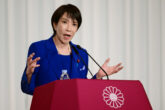January 01, 2018
US Alliances and Trump’s ‘Free and Open Indo-Pacific’ Policy
Any single year’s events can mask the true direction of longer-term trends. Time will tell, but I believe this is the case with respect to US policy toward the Asia-Pacific region during 2017. Undeniably, the year has seen momentum swings, nuclear danger and heightened uncertainty. But for all the disruption, the fundamental US commitment to regional allies is steadfast. Further, President Donald Trump’s November trip to Asia shows that he intends to build on the agenda of his predecessor by forging new and stronger partnerships in pursuit of a free and open Indo-Pacific region.
Five Geopolitical Challenges
The world is beset with grave international security challenges. Despite this trend — indeed, because of it — alliances are rising in value. Resurgent major-power competition, combined with upstart regional actors and persistent transnational terrorism, create the impression that America’s relative military and economic power is in rapid decline. Although I would argue that perceptions can deceive (America remains strong), the salient point is that the US cannot and need not face these challenges alone. Fortunately, it possesses something no other power or group can claim: an extensive array of capable, committed allies and partners with a variety of overlapping interests and values. The Trump administration is acutely aware of this fact, even as it presses allies into sharing risks and burdens hitherto unknown.
Before turning to the alliances in Asia, it is worthwhile considering the major challenges that US foreign policy faces globally: a fragmenting rules-based order; the rise of Asia (including, but not limited to, China’s re-emergence as a great power); new questions relating to the reliability of the US; mounting global challenges; and problems of governance that spill over into neighboring states and regions.
Read the full commentary in Global Asia.
More from CNAS
-
India-EU Trade Deal: A New Superpower Pact | PM Modi Holds Talks With EU Leaders
Lisa Curtis, Director of the Indo-Pacific Security Program at the Center for a New American Security, joined CNN News18 to discuss the recent India-EU trade deal. Watch the f...
By Lisa Curtis
-
Japan Wants Calm, China Not So Much
This article was originally published in Asian Military Review. One of the most serious China-Japan diplomatic crises in recent years unfolded in November after Chinese offici...
By Derek Grossman
-
America Must Salvage Its Relationship With India
The longer the current crisis lasts, the harder it will be to restore the relationship and the more likely it is that the two countries will lose an entire generation of progr...
By Richard Fontaine & Lisa Curtis
-
Indo-Pacific Security / Technology & National Security
AI and Policy, Both Foreign and DomesticIn an episode recorded just before Christmas, Darren interviews Janet Egan, Senior Fellow and Deputy Director of the Technology and National Security Program at CNAS, about AI...
By Janet Egan




